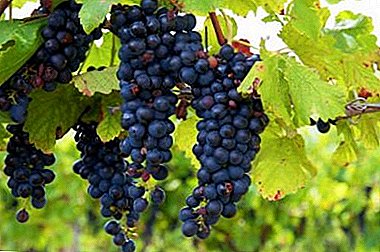
Everyone knows about this variety. It is this homemade wine - “isabelka”, as it is called, you will be offered to every hostess, in which you stop, having arrived to the south.
The attitude towards him is the most ambiguous.
Some farmers praise, others call this grape almost a weed, and wine - the worst possible.
Indeed, this subspecies refers to the table-technical varieties and its place is more likely around the columns and on the fence than in the barrel of the winemaker, precisely because of the chemical composition.
Yes, it is unpretentious, gives a rich harvest, including from old vines and replacement buds, is not afraid of disease. Is it all simple?
When does this variety ripen?
 Isabella belongs to varieties of late ripening: mid-October - early November. Around the same time, the long-awaited, Cardinal and Lady fingers are ripening.
Isabella belongs to varieties of late ripening: mid-October - early November. Around the same time, the long-awaited, Cardinal and Lady fingers are ripening.
That is why categorically not suitable for northern areas - its usual habitat is Azerbaijan, Georgia, Abkhazia, Dagestan, Krasnodar Krai, Ukraine, Crimea.
However, when creating the right conditions, he feels good even in the middle lane - for example, in the Moscow region.
Ripe berries are dark blue or blue-black, large, medium-sized, have a slightly whitish coating.
A mature cluster of medium size, cylindrical or cylindro-conical, winged.
As for Isabella white (Noah), the berries of this variety are small or medium-sized, yellowish-green and rounded. This variety is usually used as a stock.
For the "izabelny" berries characteristic mucous flesh, tart sweet taste with a slightly sour and the so-called "fox", not for all a pleasant, aftertaste.
Among the technical varieties with a less pronounced taste, it is worth noting Krasén, Montepulciano and Merlot.
Isabella Vintage Time
Isabella is cleaned in late September - in the southern strip, and in mid-latitudes - in mid-October.
In Moscow, Isabella's harvest has ripened by the end of October, and gardeners advise letting the berries hang so that they get more sugar - they will be surprisingly sweet and aromatic.
A photo




For wine or food?
Two frequently asked questions:
- When to pick Isabella grapes for wine?
- Do winemakers use this variety?
It's no secret that nowhere, besides the territory of the former Soviet Union you will not meet wine.
The legislation of the European Union and the United States officially banned this variety for use in industrial winemaking.
Isabella is allowed "access" only in juices and juice products.
Some farmers believe that it’s all nonsense, this is the ineptitude of breeders and backroom games of economists and nothing more.
However, things are not so simple. Isabella berries are characterized by a high content of pectins, which, when fermented, turn into methanol.
And this applies not only to the "pure" wines from Isabella, but also to all in general, where this grape enters. According to doctors, such drinks are harmful and even dangerous - they lead to Alzheimer's disease.oncology.
There are more healthful varieties, such as Ideal Delight, Beauty of the North and Princess Olga.
As for fresh berries - they can be consumed in any quantity, and the juices, jams, desserts are excellent.
 Private farmers argue with this, arguing that there was no better grape for home-made wines, and the whole thing was only the amount of alcohol consumed.
Private farmers argue with this, arguing that there was no better grape for home-made wines, and the whole thing was only the amount of alcohol consumed.
Any “degree”, if abused, will lead to such terrible ailments. Yes, and methanol is formed only after a lapse of time, and young wines, while respecting the "drinking culture", do nothing but good.
Sometimes they say about the so-called "tartar", dangerous to health and formed in some domestic wines.
Isabella and Lydia are credited with it, although experienced farmers say that it can also be produced in other varieties of wine. BUT its presence is not at all explained by the variety, but by the skill of some winemakers, more precisely, the lack thereof.
Useful qualities of Isabella:
- cleanses the body of toxins and waste;
- natural energy: reduces fatigue and significantly improves performance;
- improves immunity.
Risk or not - decide for yourself. Alcohol is already an unsafe thing, is it worth to use ordinary wine when there is a large selection of more noble varieties around?
Plus “Fox” fragrance Isabella like not all. In order for it to become imperceptible, a genuine craftsmanship is required from the winemaker, so again - you need to carefully watch from whom you buy "home products".
If you are looking for a truly delicious grapes, pay attention to Velika, Romeo or Chocolate.
And yet, Isabella remains the favorite of all farmers of the former USSR, especially when blended with other varieties, pleasing homemade wine lovers.












